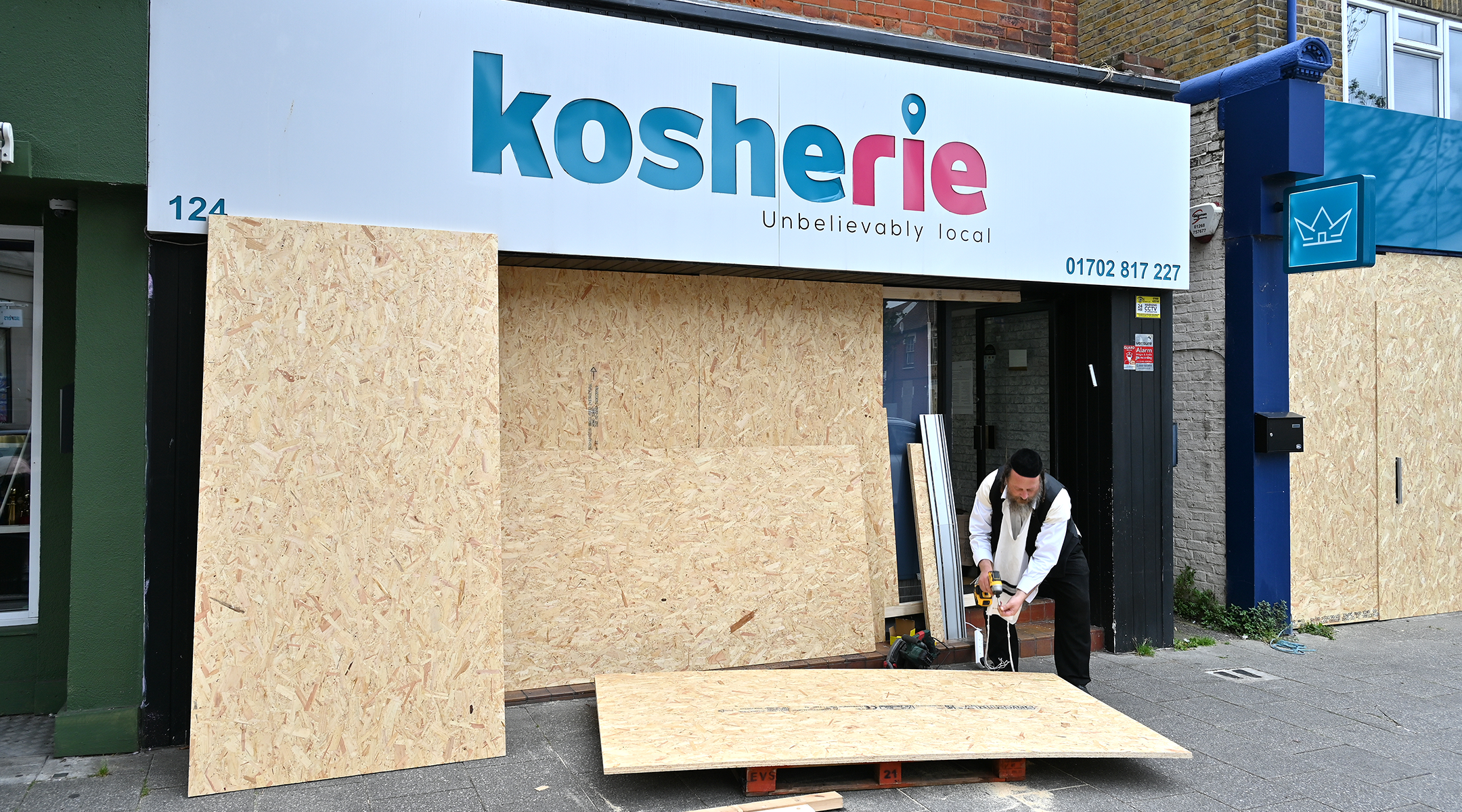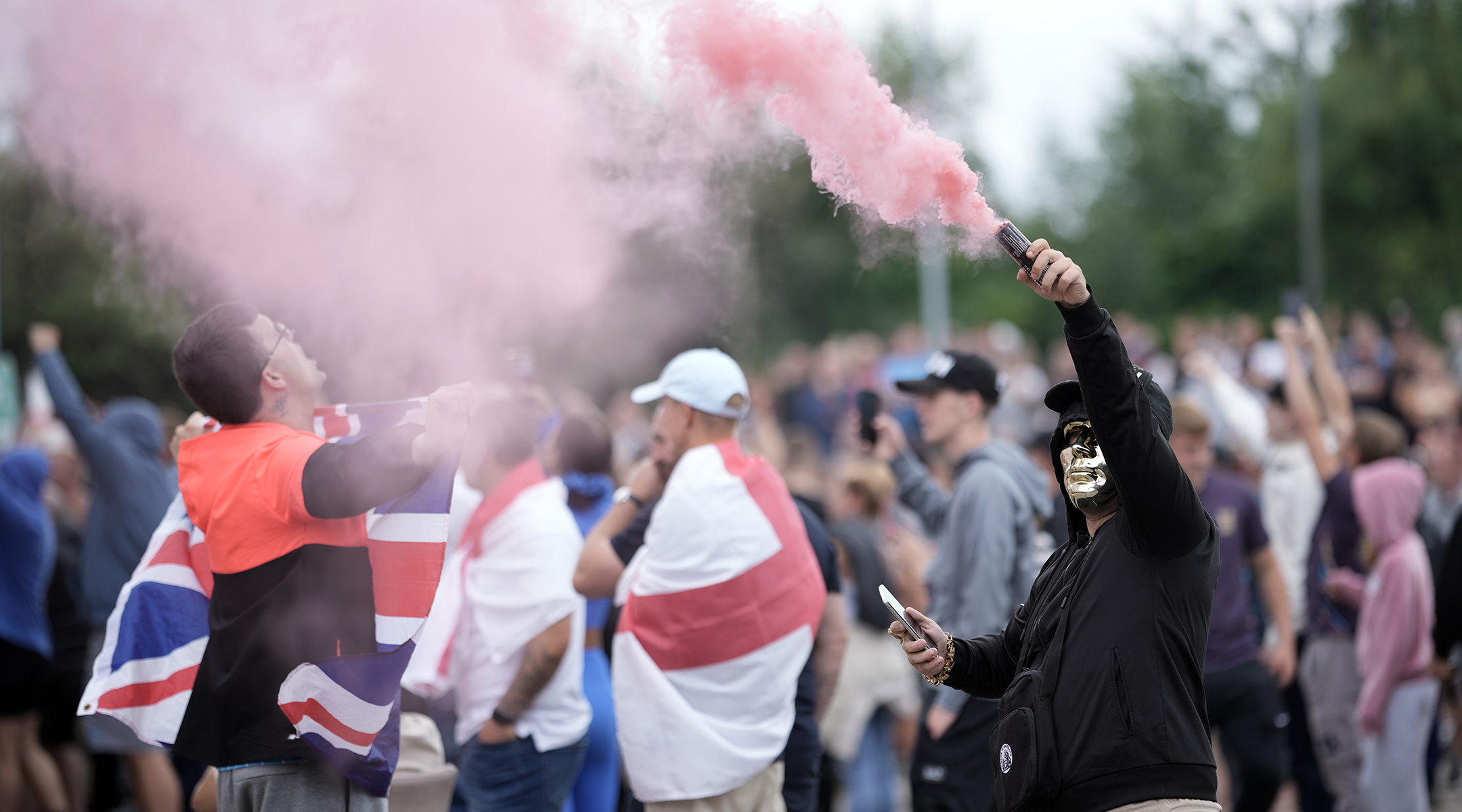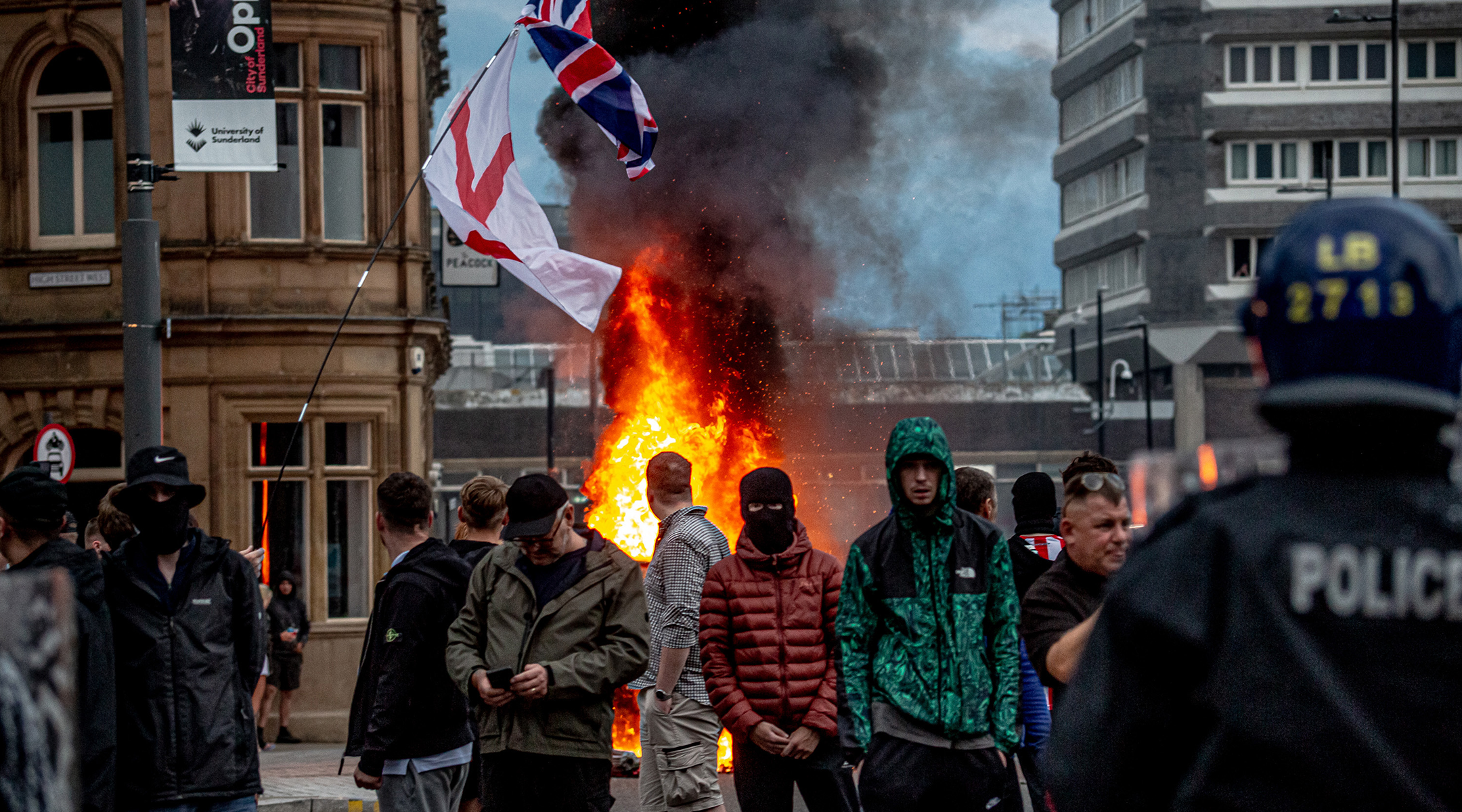As riots against Muslims and asylum seekers convulsed Britain over the last two weeks, some instigators also urged attacks on Jews and circulated antisemitic conspiracies online.
More than 1,000 people have been arrested and at least 466 face charges over the violence that swept Britain starting July 30, the day after an attacker stabbed three children to death at a dance class in Southport in northern England. The 17-year-old suspect was born in Wales to parents originally from Rwanda — but false rumors that he was a Muslim asylum seeker flew across the internet, igniting a fervor in far-right groups on platforms like Telegram and X.
A range of far-right factions, neo-Nazi activists and influencers spurred days of violent protests in more than 20 towns across the United Kingdom. Rioters stormed mosques and hotels used to house asylum seekers, attacked non-white people, set cars on fire, looted businesses and injured dozens of police officers.
British lawmakers are reportedly considering strengthening internet safety regulations after seeing how online organizing fueled the riots.
Some of the online spaces that stoked violence against Muslims also encouraged targeting Jews, according to the Community Security Trust, a group that monitors antisemitism in Britain. A Telegram group called “Southport Wake Up,” which amassed 14,000 members before it was shut down, included calls to tolerate “neither brown nor Jew” — although the online rhetoric has not manifested in any physical attacks on the Jewish community.
“In that group, there were lots of people encouraging people to go on the protests, and there were lots of other people very openly saying that as well as targeting mosques, they should target synagogues — ‘It’s not just the Muslims, it’s the Jews,’” CST’s policy director Dave Rich told the Jewish Telegraphic Agency.

The Kosherie, a kosher food shop, is boarded up in preparation for more unrest in Westcliff-on-Sea, England, August 7, 2024. (John Keeble/Getty Images)
Within the online far-right ecosystem, anti-Muslim and anti-immigrant campaigners often interact with neo-Nazis who call for attacks on Jews, said Rich. The internet and social media have turbocharged global networks of white supremacists who take inspiration from each other’s attacks on Muslims, Jews and other minorities.
One administrator of “Southport Wake Up” is believed to be a neo-Nazi based in Finland, according to an investigation by the Finnish public broadcaster YLE. The unnamed man, who was investigated by Finnish police for making an illegal threat in 2021, also runs a Telegram channel dedicated to Nazi ideology. In one post, he filmed himself walking around a synagogue in Helsinki and saying, “We are tired of explaining to you why we want national socialism.”
Several posts in “Southport Wake Up” promoted Holocaust denialism and praised Adolf Hitler. One member wrote that Hitler “was the only politician since Roman times to truly care for his people.”
“Like we are seeing today, Germany in the 1920s was a pit of despair,” said the post. “The Weimar Republic [had] immigration, child prostitution, obscene inflation, degeneracy.”
The member added that Jews “fabricated” the Holocaust to ensure “they would never again be questioned by Europeans while they destroyed their homelands.”
Another post featured an AI image of a person’s middle fingers in front of an Israeli and a Palestinian flag, accompanied by the caption, “We support neither brown nor Jew. Our nation is our land and our people. Rise, the free Europa armies.”
The riots descended on British towns plagued by economic decline, labor shortages and overburdened public services — all of which some politicians have blamed on immigration. Nigel Farage, formerly one of the chief advocates of Brexit, and currently the leader of the right-wing Reform party, falsely suggested that the Southport suspect was an undocumented immigrant before the police released details.

Anti-migration protestors riot outside of the Holiday Inn Express, which is being used as an asylum hotel, in Rotherham, England, August 4, 2024. (Christopher Furlong/Getty Images)
Alongside politicians and far-right activists whipping up Islamophobia, British Jews have also seen a recent surge in antisemitism, particularly following the Oct. 7 Hamas attacks on Israel and Israel’s ensuing war on Gaza. Antisemitic incidents in the U.K. more than doubled in the first half of 2024 compared with last year, reaching 1,978 reported incidents, according to CST.
CST works closely with Tell MAMA, or Measuring Anti-Muslim Attacks, a parallel organization that supports Britain’s Muslim community. Since Oct. 7 the groups have met almost every week, speaking jointly with police and prosecutors about combating hate crimes, Rich said.
But the reverberations of the Israel-Hamas war for Jews and Muslims in Britain have strained relations between the communities. The past 10 months have seen a stream of pro-Palestinian demonstrations and university encampments against Israel’s actions in Gaza, drawing thousands of protesters including some British Jews. While the protests have largely been peaceful, a handful of high-profile incidents of violence against Jews have heightened fear among many British Jews. And the rhetoric emerging from the protests has also made some Jews feel uncomfortable, according to Rich.
“It’s pretty clear that after the 7th of October, Muslim-Jewish interfaith dialogue took a real hit,” said Rich. “For quite a while, I think a lot of people found it difficult to maintain those conversations. More recently, there’s been a concerted effort to rebuild things and maybe learn from why, perhaps, that kind of dialogue couldn’t withstand the pressures of the 7th of October and the war since then.”
Rabbi Alexandra Wright, the president of Liberal Judaism in Britain, said the scenes of far-right violence galvanized many members of her community to affirm solidarity with their Muslim neighbors. As a member of a Jewish-Christian-Muslim clergy group in London, she helped prepare a letter of support for Southport’s Muslim community.
Rabbis have visited their neighboring mosques to stand beside imams and speak together, said Wright. Other members of the community joined last week’s tidal wave of counter-protesters, who outnumbered the rioters and formed human shields around asylum centers.
“There’s quite a lot of activism in the Progressive and the Conservative Jewish community, who do quite a lot of campaigning for asylum seekers,” Wright said to JTA. “It’s been really important for Jews to stand by Muslim communities and individuals during this time.”
In the aftermath of Oct. 7, Wright said her focus was on protecting her own deeply worried and fearful community. But the far-right riots reminded her of the importance of nourishing relationships with other minorities, she said.
“There’s a trauma that has caused us to look more inwardly,” said Wright. “It’s taken us much longer to look outwards and say, ‘What do we need to do in order to build dialogue with people who are not of our faith, who are not part of our communities?’ It’s requiring a greater effort, but nevertheless, it’s an effort that must be made.”
JTA has documented Jewish history in real-time for over a century. Keep our journalism strong by joining us in supporting independent, award-winning reporting.






